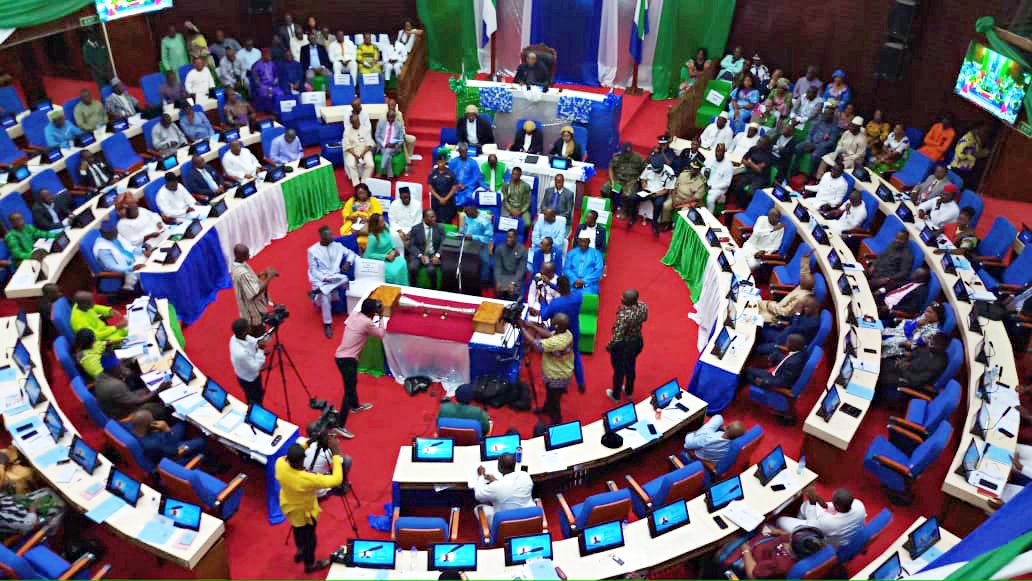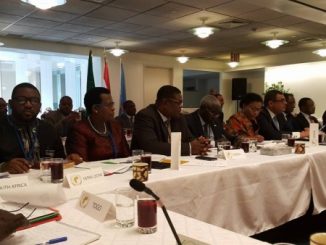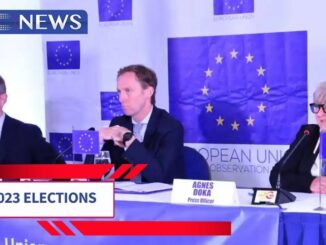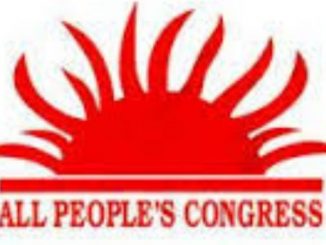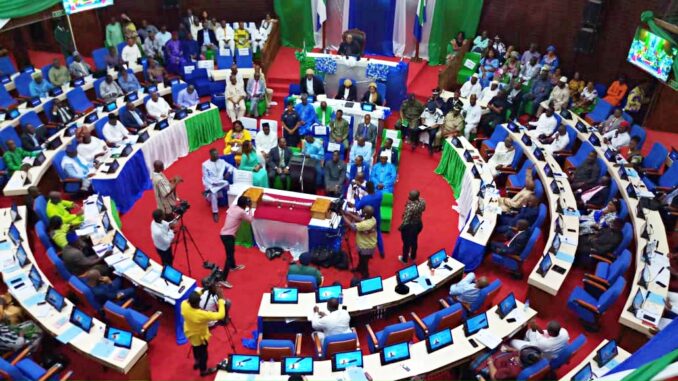
Sierra Leone: Opposition MPs supported judiciary’s hatchet man against democracy
By Matthew Anderson, Mark Feldman, and Nik Harris
Opposition Members of Parliament (MPs) in Sierra Leone collaborated with ruling party politicians to legitimize the controversial appointment of Adrian Fisher to the High Courts of Sierra Leone, parliamentary papers reviewed by Africanist Press have shown.
Adrian Fisher was appointed to the position of high court judge in Freetown two years ago. Law makers unanimously approved his appointment in December 2022, despite protests from Sierra Leonean lawyers regarding his qualifications to practice law in the West African country.
Fisher applied to the General Legal Council (GLC) to practice law in Sierra Leone in 2015, but his application was refused. Justice Adeliza Showers ruled a year later that “the General Legal Council had abused its power in considering Fisher’s application and carried out several procedural irregularities, which amounted to abuse of power, which the Court cannot overlook.” Sierra Leone’s Constitution provides in Section 135(3) that no one may be appointed as a judge of the Superior Court of Judicature unless she or he is qualified to practice civil and criminal law in Sierra Leone or in countries with an analogous legal system and has been approved by the Judicial and Legal Service Commission.
Judge Showers granted an order quashing the decision and instructing the GLC to reconsider Fisher’s application in accordance with the findings of the Court. Despite this order, lawyers in Freetown insisted that Fisher’s legal qualifications remain questionable.
While questions about Fisher’s qualifications to practice law linger, Fisher continues to preside over cases in Sierra Leonean courts. Since Maada Bio assumed power in 2018, Fisher’s name has appeared on almost all judicial trials involving leading opposition politicians and other perceived critics of the Maada Bio regime. In 2020, for example, Fisher helped prosecute former defense minister, Alfred Paolo Conteh, in a treason trial. Other accused persons prosecuted by Fisher included Rtd. Colonel Sahr Sinnah and Prince George Hurges, who were also wrongfully charged on treason related allegations along with Paolo Conteh.
Months before the Paolo Conteh treason trial, Fisher also participated in a trial involving former Freetown Mayor, Herbert George-Williams, and opposition activist, Abubakarr Daramy on allegations of murder. And in April 2022, Fisher passed an infamous ruling that dismantled the extant executive structures of the All Peoples Congress (APC), the major opposition party in Sierra Leone, and appointed a 21-member caretaker executive, a decision that rendered the opposition party largely dysfunctional until its recent convention.
But despite the clearly unresolved questions around his legal qualifications, Fisher’s high court appointment also opened another legal problem. Section 135(2) of Sierra Leone’s 1991 Constitution makes it mandatory for anyone appointed to serve as a judge of a Superior Court to first appear before Parliament for scrutiny and approval ahead of occupying the said position.
“Judges of the Superior Court of Judicature shall be appointed by the President by warrant under his hand acting on the advice of the Judicial and Legal Service Commission and subject to the approval of Parliament,” the Sierra Leone Constitution explicitly states.
However, Fisher, has occupied the position of high court judge and presided over numerous trials involving opposition politicians and other critics of the Bio regime for over two years without parliamentary approval.
Despite the lingering constitutional questions surrounding his appointment, Fisher and nine other judges finally appeared before Parliament in December 2022 for approval. Records of the proceedings show that opposition MPs willingly supported ruling party members in the House of Parliament in approving Adrian Fisher without any objections despite the existing challenges to Fisher’s qualifications to practice law in Sierra Leone.
This issue is important because during the last two years, Fisher has been involved in virtually every judicial case involving leading APC politicians and opponents of the Bio regime. Fisher’s most notable case is the ongoing trial of Samura Kamara, the APC’s 2023 presidential candidate.
Samura Kamara has been in court before Fisher for more than a year now on corruption allegations brought against him by Sierra Leone’s Anti-Corruption Commission (ACC). Kamara’s supporters say the court trial is aimed at disqualifying Kamara, who is, at present, the leading challenger to President Bio in the upcoming June 2023 elections.
The Kamara trial, which commenced on 14th December 2021, has dragged on slowly with no progress reported and no clear end in sight. In the last 14 months, court proceedings have not produced any evidence linking Kamara to the corruption allegations. The ACC presented 18 witnesses, including Alie Kabba who served as Minister of Foreign Affairs and Ambassador to the Sierra Leone UN Mission in New York between 2018 and 2021 when the US$4.6 million corruption scandal occurred. Kabba’s testimony, as a leading witness in the proceedings, exposed more holes in the ACC’s case against Kamara, further revealing the obvious efforts of the regime to rope-in Kamara.
The Kamara trial itself has proceeded slowly mainly due to the prosecution and dozens of adjournments from Fisher himself. Many Sierra Leoneans have questioned the decision to assign the Samura Kamara case to Fisher; describing him as a legal mercenary hired by both opposition and ruling party politicians to prosecute a leading political opponent of the Bio administration.
Former Freetown Mayor, Winstanley Bankole-Johnson wondered why the judiciary and parliament allowed Fisher to commence or continue presiding as a high court judge for over two years unchallenged.
“I feel terribly ashamed for my country because it logically follows that for as long as he had been presiding as such within the judicature of Sierra Leone prior to that substantive parliamentary approval and confirmation, he had been doing so irregularly,” Bankole-Johnson stated.
Winstanley Bankole-Johnson is one of few opposition politicians to have openly criticized the parliamentary decision to legitimize Fisher’s role in the judiciary. Sierra Leone’s parliamentary papers reviewed by Africanist Press show that opposition MPs, on the other hand, did not object to Fisher’s appointment, or any of the judges that appeared before Parliament on 8th December 2022. Clerk of Parliament, Hon. Paran Tarawally confirmed that Fisher and the other judges received a unanimous vote of approval by MPs.
“The Parliament of Sierra Leone has with unanimity approved seven High Court and three Appeals Court judges to serve in the superior courts of judicature,” a statement from the Parliamentary Clerk’s Office stated.
Indeed, records of the Votes and Proceedings of Parliament for 8th December 2022 show that about 112 MPs were present, including opposition parliamentary leader, Hon. Chernor R. M. Bah, and opposition whip, Hon. Hassan Sesay. Hon. Bah avoided proceedings in the ECOWAS Parliament in Nigeria the previous day, and instead travelled to Freetown to help approve Fisher’s appointment. The opposition MPs legitimized Fisher’s controversial role as high court judge without any dissent or objection.
During the voting process that approved the appointed judges, Hon. Bah praised Fisher’s role in the judiciary and asked that judges salaries be increased, and that their conditions of service needed to be improved.
Other opposition APC members also joined the APC’s parliamentary leader to endorse the judges’ appointment. Opposition Whip, Hon. Hassan Sesay of the APC, described Fisher and other appointed judges as “consummate professionals,” saying they were “qualified and competent for their position.” Sesay’s colleague in the APC, Hon. Abdul Kargbo went as far as describing Fisher and the other judges as “men and women of integrity and character.”
Meanwhile, other lawyers continue to argue that Fisher does not meet the stipulated constitutional requirements to practice law in Sierra Leone. They argue that it is “illegal” that the Law Officers Department retained him as a judge.
Parliamentary records show that the opposition MPs did not discuss Fisher’s qualifications to practice law in Sierra Leone, and neither did they question Fisher’s role in the ongoing court cases against leading opposition politicians, including Samura Kamara, the APC’s 2023 presidential candidate.
At the recently concluded APC national delegates conference in February, Kamara won an unprecedented majority vote to lead the opposition party in the June 2023 elections. In the last presidential elections, Maada Bio, the current president, won narrowly against Kamara by less than 2% in both rounds of the presidential race that brought Bio to power in 2018. Four years on, Kamara’s popularity has increased, and supporters of his campaign have multiplied amidst Bio’s growing unpopularity across the country.
A real possibility of defeating Bio in the June 2023 elections turned Kamara into the most obvious target for both the ruling party and Kamara’s colleagues in his own APC party. Kamara’s growing appeal within the rank and file of the APC and the real electoral challenge he poses to President Bio has led to him being targeted by internal opponents in the APC. Oddly enough, Hon. Chernor Bah, the APC’s parliamentary leader who led the opposition campaign to approve Fisher in Parliament, has now been recently appointed the APC’s vice presidential candidate by the National Advisory Council (NAC) of the party to deputize Kamara in the elections. The decision has raised serious questions relating to Bah’s actual loyalty to Samura Kamara, the presidential candidate, who many believe is the target of a planned disqualification in the pending elections.
Many in Sierra Leone see Fisher’s role in the judiciary as an epitome of Maada Bio’s progressive use of the courts against selected opposition politicians and other opponents of the Sierra Leone Peoples Party (SLPP).
Amadu Koita Makalo, an APC activist now exiled in the United Kingdom, recalls the injustice he suffered under the hands of Fisher. Koita says Fisher was the leading prosecutor in his trial and was instrumental in ensuring that he was kept for nine months in solitary confinement at Pademba Road (Freetown’s Maximum Central Prison) while undergoing trial on allegations of seditious and defamatory libel against President Bio.
Koita was later acquitted of the charges without any compensation for wrongfully detention by the Sierra Leonean state. Koita, now a harsh critic of the Bio regime, is among the growing number of Sierra Leonean exiles in Europe and the United States who have remained increasingly worried over the increasing collapse of democratic governance in Sierra Leone.
Mohamed Warisay, former executive director of Democracy Sierra Leone, says the judiciary has become a tool in the hands of ruling party politicians and their opposition allies against genuine opponents of the Bio regime.
“Lack of judicial independence has the potential to undermine free and fair elections, and will serve as a catalyst for electoral violence,” Warisay noted.
We published on the Africanist Press website documents from the Sierra Leone Parliament including the Votes and Proceeding of 8th December 2022 to illustrate the evidence upon which this report is based.

